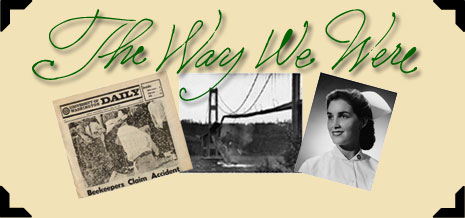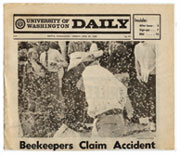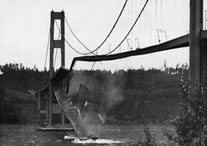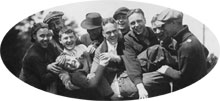

CAMPUS CONTROVERSIES
BIBLE TRIAL
In my case there is no doubt that the "Bible trial" of 1966 is my most significant experience since I came here from the University of Pennsylvania in the fall of 1952. The effort of two fundamentalist ministers to stop teaching of the Bible as literature at the UW came about in an interesting way. I received a phone call from the Rev. Thomas W. Miller, who expressed a desire to learn something about my "Bible as Literature" course. He seemed quite attracted to the course subject, and had many questions, until I finally suggested that he obtain a copy of my syllabus at the University Book Store. He thanked me and I thought this was the end of it.

In January 1966, Rev. Miller called me again, this time inviting me to appear as a guest on his radio program to discuss my syllabus. I was in no mood to do this, but thanked him for calling. He then went ahead with his own discussion of the syllabus on the radio. I did not listen to his program, but I got almost daily reports from colleagues at the University. They reported that Rev. Millers' opinion of my syllabus was not good. Eventually he announced his intention to bring suit against the UW to stop it from teaching the Bible course.
It does not say in the Constitution that you can't teach about religion. We won the case, which went all the way up to the U.S. Supreme Court.
-English Professor Emeritus David C. Fowler
NO TO LOYALTY OATH
In the early 1960s many states required faculty at public universities to sign a loyalty oath. This was clearly in violation of the constitution and it was especially offensive to me because, during the war in the Netherlands, my fellow students and I were required to sign a loyalty oath to Hitler in order to attend the University of Utrecht. Most of us did not sign and could not attend the university. After the war, when the university was functioning again, the students that had signed the oath were not allowed to attend for two years. So I was glad to join the faculty at UW in their effort to eliminate this requirement. The case went to the U.S. Supreme Court and we won. It was this initiative that eliminated the loyalty oath requirement in other states as well.
-Joost Businger
ROTC BUT ANTI-WAR
I entered the "U" in fall of 1968 at the height of the Vietnam controversy. As a Navy ROTC scholarship recipient it was expected that I would be a fairly strong supporter of U.S. policies. On the contrary, while wearing my uniform on campus-and being attacked by trained "biting dogs" at the HUB-I was an anti-war protester in my off hours. Luckily, my academic performance at the "U" was fairly high as I was discovered marching down the freeway after the Kent State incident-not what a compliant future Navy officer was supposed to do. Nevertheless, my political statements throughout my undergraduate years did little to hurt my Navy career-nine years on active duty, including being sent to law school at the "U," and an additional 22 years in the reserve where I've returned almost every year to teach military law in Clark Hall at the NROTC Unit.
-Jon Bridge, '72, '76
THE BEE INCIDENT
While attending during the late '60s, there were a lot of anti-government demonstrations. On a rare bright and sunny afternoon, a group of radicals planned to march from the HUB with the purpose of shutting down a building where government job interviews were taking place. As a student taking sociology and "anthro" classes, I thought I would observe and perhaps write a report on what happened. As the march proceeded, the radicals were confronted by a counter-demonstration group in the middle of the service road behind the HUB.  Scuffling broke out and then, out of nowhere, a pickup truck full of beehives tried to crawl through the melee. Some of the demonstrators wouldn't get out the way and the truck was forced to come to a sudden stop, which caused some hives to spill onto the road releasing thousands of bees into the crowd. As everyone backed away, someone in full beekeeping gear jumped out of the truck and began cleaning up the mess. Then, some of the more violent students picked up rocks and sticks and began hitting the truck, taking out a few lights in the process. Although I was a good 30 yards away, I managed to get stung on my head several times. Once the hives were loaded back onto the truck, it sped off under a hail of rocks, soda cans, etc.
Scuffling broke out and then, out of nowhere, a pickup truck full of beehives tried to crawl through the melee. Some of the demonstrators wouldn't get out the way and the truck was forced to come to a sudden stop, which caused some hives to spill onto the road releasing thousands of bees into the crowd. As everyone backed away, someone in full beekeeping gear jumped out of the truck and began cleaning up the mess. Then, some of the more violent students picked up rocks and sticks and began hitting the truck, taking out a few lights in the process. Although I was a good 30 yards away, I managed to get stung on my head several times. Once the hives were loaded back onto the truck, it sped off under a hail of rocks, soda cans, etc.
There were other such extracurricular incidents on and around the campus during that period including the fiery razing of the ROTC building, the bombing of the administration building, and a riot complete with store looting and police-car burnings on the Ave. Whew!
-Edwin Lackey, '76
HISTORIC MOMENTS
WATCHING THE BRIDGE GO
Any thoughts of the "U" bring back a flood of memories. Most of them very happy memories; some dramatic, some startling, and some comic. One of the most dramatic came suddenly.
In the rush of '40-'41 a group of us were enjoying lunch when an out-of-breath fellow burst into the dining room yelling, "the Narrows Bridge is falling." In a matter of seconds a group of us were in a couple of cars racing to Tacoma. It was awesome to see huge lengths of roadway slowly peeling away from the support cables. When what was hanging became too heavy, a huge hunk of roadway would break away and plunge 300 feet into the racing current of the Narrows.

As these tons of roadway dropped away, the long central span became lighter and lighter, allowing the towers to bend shoreward. The towers were being pulled by the weight of the shore-side spans which still hung together. The six-foot high solid plate girders demanded by the insurance company were not only a major factor in the failure, they were now creating a hazard to those on shore. As the towers bent, as the side spans sagged, these plate girders and their riveted joints were severely stressed.
Suddenly these over-stressed rivets began exploding like small cannon shells, sending rivet heads bullet-like in all directions. One could hear these projectiles crashing through the woods shearing off small tree branches.
It was a sad but awesome sight to see this great structure slowly tear itself apart. Engineering Professor Frederick Farquharson set-up a special laboratory to study this disaster. Many lessons were learned, including the need for emergency strengthening of the Golden Gate Bridge. This was done quickly but quietly.
-Kent R. Willson '44
QUAKING MOMENT
As a graduate student, I took a required seminar from Sophus Winter in late 19th century literature, my chosen specialty. About a dozen of us sat around an oblong table, Winter at one end, in a classroom on the second floor of Parrington Hall. One day our subject was Cardinal Newman's theory of the preeminence of divine knowledge. After considerable discussion we had pretty much decided that today secular knowledge was necessary before divine knowledge came into play, whereupon the ceiling begin to rattle, the overhead lamp swung back and forth, and the floor swayed to and fro. In the instant we realized we were having an earthquake, Winter rose to his feet, the tips of his fingers on the table. "Perhaps," he said, moving quickly with the rest of us to the door, "we ought to change our minds."
-Phyllis Dorset, '48, '50
CAMPUS PRANKS
WATER, WATER EVERYWHERE-BUT HERE
Yes it was spring and a young man's fancy turned to-mischief. Tomorrow would be the first of April and-April Fool's Day. "ECR" and I set our alarms to wake at 3 a.m. (I use initials because there still may be a house mother or two looking for our scalps.) I had gone home to get an assortment of tools for our misadventure.
The sun rose early but the city was quiet. No rational person would be out and about at this unearthly hour. Undisturbed and unnoticed we went from sorority to sorority lifting the water meter covers and shutting off the water.
For these hundreds of self-conscious young ladies there were no showers, no water to boil an egg, not even a drop to moisten a toothbrush. When one young lady headed next door to 'borrow' some water she met another headed her way to get water from her. It was Disasterville on campus that morning.
April Fool's Day was a harrowing memory long after normalcy was restored. The perpetrators maintained a discreet silence so they could live to tell this tale.
-Kent R. Willson, '44
FROSH POND PLUNGE
It was Saturday, Dec. 10, 1960 (which is my birthday) and I was enjoying my freshman year. The weather was freezing but I was all cozy and warm, snuggled in my dorm room bed in Lander Hall. At about 5:30 a.m., there was a knock on my door and my roommie hopped up to let a bunch of my buddies in to celebrate my birthday. They grabbed me and dragged me off to Frosh Pond.

Joined by eight of my best friends, I endured the cold weather, wearing only my PJs. As we neared frosh pond, a campus police officer drove up. I thought to myself, "Saved! No swim today." But he said we better get on with the party because the pond was freezing over. So they carried me to the edge and 1, 2, 3-OOHH! I flew into Frosh Pond, breaking a thin layer of ice in the freezing water. I went to the bottom and shot out like a porpoise-except my pajama bottoms remained in the pond. My buddies yelled, screamed and ran back to the dorm, leaving me shivering and uncovered from the waist down. I ran back toward the dorm when about halfway there I discovered a blanket left for me by my buddies. When I got back to the dorm there were about 20 to 30 guys hooting and hollering and celebrating my birthday.
-John Stupey, '65
The University of Washington thanks all the alumni who provided us memories of their student experiences.
Go To: Page 1 | Page 2 | Page 3